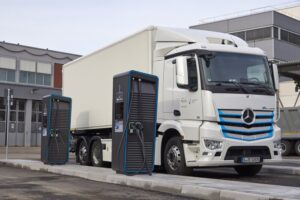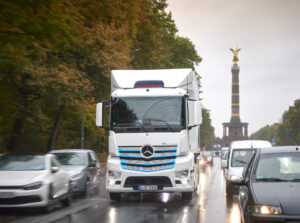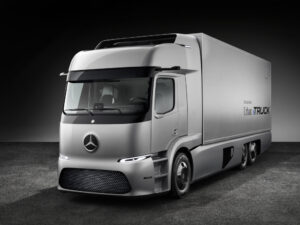Daimler introduces Electric Trucks. What does it mean?
18 Feb, 2026
What does it mean for the commercial vehicle industry in India?
The world’s leading manufacturer of trucks and buses, Daimler AG has announced its clear commitment towards green energy with the expansion of its Electric Trucks segment. This could be spurred on because of an increased need for cleaner, emission-free commercial vehicles on the road. Daimler plans to introduce their new plan for future mobility in India under its medium and heavy-duty trucking manufacturing brands- Fuso eCanter & Bharath Benz.

Fuso eCanter
Since July 2017, Daimler has been manufacturing and distributing their first of small scale electric trucks under the brand name Fuso eCanter at their plants in Tramagal, Portugal, and Kawasaki, Japan. Their all-electric trucks can be seen all over the world in major cities including New York, Tokyo, Berlin, London, Amsterdam, Paris, Dublin, Copenhagen and Lisbon. Fuso eCanters plans for more all-electric trucks to be seen on Indian roads as well.
Mercedes Benz Fuel Cell Truck
Daimler’s technological strategy to make their zero-emission dream a reality starts with the production and availability of the new concept Mercedes Benz Fuel Cell Truck globally. The all-electric truck powered by a hydrogen-based fuel cell was presented first when it was introduced at the Paris Climate Protection Convention where it was praised for its innovative, economic and ecological design.
For commercial purposes, Daimler intends to introduce its battery-powered electric trucks for the transportation of small loads over short distances. The more powerful fuel cell powered electric trucks would be introduced for bigger loads over longer distances. Their line of all-electric trucks are to be
What does this mean for the commercial vehicle industry

Advancements in the field of electric vehicles are becoming more and more prominent. People have started to recognise the importance of sustainable living, looking for greener options in all vehicle segments. A study showed that though medium and heavy-duty trucks only constitute 9% of the total global vehicle stock. These trucks contribute about 39% of the total transport sectors’ greenhouse gas emissions because of their inefficient diesel engines and the high average annual mileage. A figure the manufacturers cannot overlook anymore.
Manufacturers are coming up with more sustainable alternatives that would help to lessen greenhouse gas emissions that the Diesel engines are contributing towards. This is where the new all-electric trucks segment comes in.
With the introduction of all-electric trucks which proposes CO2– neutral alternatives for truck drivers, Daimler aims to further advance electric commercial transportation which not only aims to produce ecological results but also economic results as well. They believe strongly that both economic and ecological aspects should be on par with each other. This is why investment is poured into developing their highly efficient Diesel engine to go hand in hand with the availability of local emission-free electric drives. But in the end, for the feasibility of any business in India, it all comes down to how economically sound the electric trucks would be.
Economy Vs Ecology
The economic feasibility of electric trucks in India has not been able to outweigh the ecological challenges of today. Large corporations have started to invest their resources into building a future where it does become economically feasible for electric trucks to be on the road. A few of the strategies they propose to make this happen are:-
1. Hydrogen-Powered Fuel Cell
The production and availability of high powered fuel cell technology have become a necessary step to take today for saving the world tomorrow. The fuel cell runs with Hydrogen as energy storage which shows immense potential for clean and efficient energy sources as CO2 neutral alternatives- a necessity to reach emission norms. The mass production of hydrogen-based fuel cells could potentially bring down the overall costs of acquiring them. Daimler has already crossed over to Hydrogen-based fuel cells in their consumer electric vehicles and now is presently crossing over in commercial electric trucks as well.
2. Ultra-Fast Charging Batteries
Daimler has invested in Israeli company StoreDot Ltd, a pioneer of nanotechnology material and their use for ultra fast-charging batteries. This strategic partnership plans to bring out rapid charging systems which help to charge an electric truck at the same time it takes to refuel a truck.
3. Local Charging Stations
With more and more local charging stations inaugurated, we can see a road to sustainable energy supply for electric vehicles more clearly. The free of cost electric charging adds an incentive as well as an economic benefit for those who opt for electric vehicles in the long run.
4. Low Maintenance Cost
Unlike the highly ineffective diesel engines in the market which require continuous maintenance on a quarterly year basis, the benefit of the all-electric vehicles is that the maintenance cost is extremely low.
5. Government Aid
The climate change conventions, like the Paris Climate Accord, have opened the eyes of many to the drastic changes needed in the transport sector. Many of the governments of the world plan to provide financial support for the electric vehicle segment which include tax reductions and financial aid. India has invested in projects like the Production-Linked Incentive (PLI) Scheme and Faster Adoption and Manufacturing of Electric Vehicles (FAME) India Scheme. These projects would help in the deployment of charging infrastructure as well as building better batteries.
The Future For Sustainable Energy Source For Commercial Transportation

The world is progressing towards more ecologically sustainable logistical alternatives. Daimler has paved the path for renewable and clean energy for commercial transportation. They hope to lead the way for all other electric vehicle segments to follow with their clean and renewable electric system, an innovation that brings both ecological and economic benefits. Many future developments such as self-driving trucks, solar-powered renewable energy sources, and complete conversion from fuel to electric are what the future holds in store.

